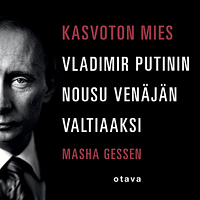Take a photo of a barcode or cover
informative
Once the institutions of democracy had been dismantled, it was impossible -- it was too late -- to organize to defend them.
I first read The Man Without a Face on my Kindle. This time, I listened to the audiobook (narrated by the author). This is a fascinating book because it’s not only written by an expert journalist who’s watched Putin over the years, she also lived in USSR/Russia so her firsthand accounts are fascinating. Highly recommended to those want to understand and learn more about Putin.
A real eye-opener.
I'll be honest, I'm still very much a newbie at Russian history so this is just the start of what I'll be reading to learn more. And it's a good start. I can't really look at any of this with a critical eye since I have next to no background information and am acknowledging this by putting the book on my 're-read potential' list, which I can revisit when I've done more research.
That said, it doesn't take an expert to see the passion Masha Gessen puts in her writing, which means it isn't exactly objective. It still served its purpose though. It's tricky to separate the author from many of the events because she was there living through it or directly reporting on it at the time and also did know quite a few of the people/targets/victims, so inevitably, there is that initial surprise at the personal seeping through in the book, but it doesn't distract from the goal of this book. Even the most casual reader can be informed by this book of what has occurred under Putin's regime: the dismantling of democratic forums and the gains made after the fall of the USSR, censorship and control of media, acts of terror, arrests of dissidents from journalists to the very rich who dare to speak out and/or attempt change to the system, outright attacks (Marina Litvinovich, beaten unconscious) and murders of these dissidents whether through prison (Sergei Magnitsky, peritonitis) or poison (Alexander Litvinenko, polonium) or other weapons (Anna Politkovskaya, shot dead in the elevator in her apartment building, but not before being poisoned but survived that), and so on and so forth.
This may not be the most subjective read out there but the important thing is that books like these exist and the events and names of the lives lost are marked and not forgotten. I never knew about events like the bombings of September 1999, the Kursk disaster of August 2000, the Beslan hostage crisis of September 2004, the Moscow theatre siege of October 2002, and so on during this brief period. It's horrifying that it isn't even that long ago. I hear enough vague statements made about the country but didn't have a mind to look into it, so for that, this book is a concrete beginning for me.
I'll be honest, I'm still very much a newbie at Russian history so this is just the start of what I'll be reading to learn more. And it's a good start. I can't really look at any of this with a critical eye since I have next to no background information and am acknowledging this by putting the book on my 're-read potential' list, which I can revisit when I've done more research.
That said, it doesn't take an expert to see the passion Masha Gessen puts in her writing, which means it isn't exactly objective. It still served its purpose though. It's tricky to separate the author from many of the events because she was there living through it or directly reporting on it at the time and also did know quite a few of the people/targets/victims, so inevitably, there is that initial surprise at the personal seeping through in the book, but it doesn't distract from the goal of this book. Even the most casual reader can be informed by this book of what has occurred under Putin's regime: the dismantling of democratic forums and the gains made after the fall of the USSR, censorship and control of media, acts of terror, arrests of dissidents from journalists to the very rich who dare to speak out and/or attempt change to the system, outright attacks (Marina Litvinovich, beaten unconscious) and murders of these dissidents whether through prison (Sergei Magnitsky, peritonitis) or poison (Alexander Litvinenko, polonium) or other weapons (Anna Politkovskaya, shot dead in the elevator in her apartment building, but not before being poisoned but survived that), and so on and so forth.
This may not be the most subjective read out there but the important thing is that books like these exist and the events and names of the lives lost are marked and not forgotten. I never knew about events like the bombings of September 1999, the Kursk disaster of August 2000, the Beslan hostage crisis of September 2004, the Moscow theatre siege of October 2002, and so on during this brief period. It's horrifying that it isn't even that long ago. I hear enough vague statements made about the country but didn't have a mind to look into it, so for that, this book is a concrete beginning for me.
This book grew on me! I realized this when I was bought a car this weekend & was talking to the car guys about Putin. When I chat up strangers about the book I’m reading, that’s when I know it’s had an impact.
I learned so much! But not about Putin because he’s impossible to know. He’s like an earthquake - you only know him by the destruction in his wake.
I wish this had been better edited and not so scattered but I don’t know if the effect would’ve been any different. Also, there were like 4 post-scripts, but this is the kind of thing that needs 4 post-scripts (one of them so unnerving that I held my breath reading).
I learned so much! But not about Putin because he’s impossible to know. He’s like an earthquake - you only know him by the destruction in his wake.
I wish this had been better edited and not so scattered but I don’t know if the effect would’ve been any different. Also, there were like 4 post-scripts, but this is the kind of thing that needs 4 post-scripts (one of them so unnerving that I held my breath reading).
Really enjoyed this -- written in a more casual tone by someone who was in Russia and experienced everything firsthand. Learned a lot about Putin (not that I knew a lot about him before reading this book) and it was pretty interesting
Masha Gessen is a fantastic writer and thinker. This book is a joy to read as a book and as an opinion piece. What it probably isn't is the whole truth about Russia's president. The guy is popular with many Russians, though after reading this book one can't imagine why. Therein lies the problem, and the star I struck from my original rating.
I think Gessen has captured a mostly true picture of Putin, by doing a lot of meticulous research and by living in his Russia for many years as a person, not exactly a dissident, but someone who is an independent thinker and who doesn't align herself with any of the factions. Still, her view is one of the upper middle class intelligentsia, even though she rails against this group for not immediately seeing Putin for what he really is. Her concerns are their concerns. They are valid and very important. But they are not the full picture.
I think Gessen has captured a mostly true picture of Putin, by doing a lot of meticulous research and by living in his Russia for many years as a person, not exactly a dissident, but someone who is an independent thinker and who doesn't align herself with any of the factions. Still, her view is one of the upper middle class intelligentsia, even though she rails against this group for not immediately seeing Putin for what he really is. Her concerns are their concerns. They are valid and very important. But they are not the full picture.
A truly horrifying look at Putin’s rise and grip on power in Russia. Written with lots of Russian history context, which was helpful but also slowed the pace. Worth reading as Putin begins his second (or fourth) term as President this year.
Important to read. A cool headed look at Putin and his doings in post Soviet Russia. Read if only to see how stupid Trump was to praise Putin's leadership. To quote Mel Brooks "Hitler was a better dancer than Churchill!"







